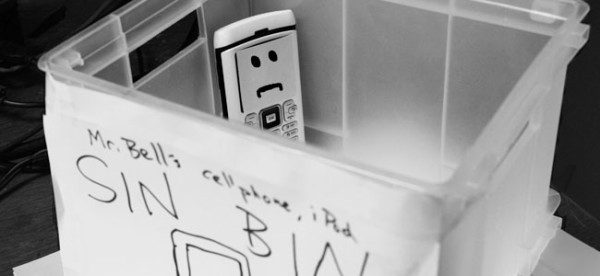The cell phone. Almost everyone has one. Most people can’t seem to live without it and are attached 24/7 to it. It lives in your pockets and purses.
It has been rumored that your cell phone can give you radiation poisoning, blow up a gas station, or electrocute you while it’s charging.
As technology becomes more and more prevalent in our everyday lives, more people are getting cell phones. Androids and iPhones have overtaken note-passing as the way students communicate in school. Some teachers, such as Laura Flores Taylor are strongly opposed to the prevalence of the phone in the classroom.
“I think that the cell phone is the enemy of learning in the classroom due to the distraction it creates. I usually ask for the phone to be put away or send the student to the office,” said Flores Taylor
There are students who agree that cells are too distracting.
“When someone has their phone out, it’s obvious. It’s distracting because everyone watches them text,” said freshman Rebekah Best.
The district policy on cell phone usage while at school is stated as the following in the 2011-2012 North Kansas City Handbook: “The inappropriate and improper use of cell phones and other electronic devices causes a disruption to teaching and learning. […] As a privilege for students, the use of cell phones is permitted before and after school and during passing periods between classes. Cell phones may not be used during classroom instructional time.”
The district approved consequence of using a cell phone in class is the following according to the district policy:
1st infraction: Warning; cell phone must be put away.
2nd infraction: Cell phone will be confiscated and delivered to the office; the student may pick up the cell phone at the end of the school day; parent/guardian will be contacted.
3rd (+) infraction: Cell phone will be confiscated and delivered to the office; a parent/guardian may pick up the cell phone at the end of the school day; student assigned one (1) day of in‐school suspension (ISS); parent/guardian will be contacted by an administrator.
Even though this is the district policy, teachers can dictate how it is carried out in the classroom. Some teachers stick to the guidelines while others have their own rules on if cell phones can be used during class or not.
Student teacher Austin Bell keeps a cell phone ‘Sin Bin’ box to put cell phones in when students are using them in class.
“I’m glad that teachers have the authority over cell use in the classroom like we do. If a student has a cell phone out in class but is responsible and respectful, that’s fine, but if a student needs to be told multiple times to put the phone away then usually it’s easier to take it,” Bell said.
Students however don’t always appreciate having their phones taken from them.
“It’s okay if the person was disturbing class time but if a teacher takes a phone when someone is just checking the time or something, then I don’t think that it’s fair,” sophomore Emily Reyes said.
“I think it’s fine if a teacher takes a phone for the duration of class, but I don’t think that the office should be able to take the phone until the end of the day,” senior Ceres Campos said.
Whatever your stance is on texting in the classroom, for or against, remember to use your phone responsibly and to be respectful.









